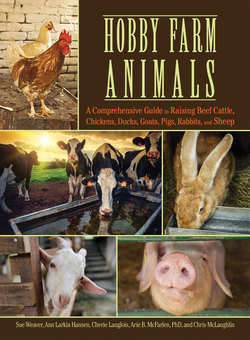Читать книгу Hobby Farm Animals - Chris McLaughlin - Страница 3
На сайте Литреса книга снята с продажи.
Selecting and Bringing Home Beef Cattle
ОглавлениеAttention to the basics of raising beef cattle will reap rewards in the form of a freezer full of homegrown beef as well as extra cash from meat and calf sales. Where cattle are common, so are the auction barns, truckers, and processing plants that make it fairly simple to buy, sell, and process cattle. Americans love beef, so there is a ready market for beef cattle.
There’s another benefit to owning beef cattle: they can improve your land. This may come as a surprise, given the reputation cattle have acquired in certain quarters for overgrazing and destroying sensitive lands. But beef cattle are a tool, not a cause. The result depends on how the tool is wielded—just as a hammer can be used to fix a building or destroy it. Research and on-the-ground experience have demonstrated that, when properly managed, beef cattle can be a highly effective tool for restoring health to damaged grasslands and watersheds. On a hobby farm, well-managed cattle can continually increase the richness of your soils, the biodiversity and lushness of your pastures, and the water quality of your ponds and streams.
Beef cattle will also enhance the view from your kitchen window. Every time I look out the window to see our cattle grazing the green slopes of our farm, hear bobolinks singing in our pasture, or prepare homegrown steaks for dinner, I’m glad we have beef!
For hundreds of years, people have bred cattle to develop characteristics that were best adapted to a particular climate and purpose. Eventually, this resulted in distinctive breeds of cattle, each with a distinctive palette of physical traits. Today, a cattle buyer can choose from a wonderful array of color, build, size, growth rate, and potential meat and milk production to fit cattle to the farm, the climate, and the purposes of the owner.
Although not all cattle are created physically equal, they do share general behavior characteristics. Cattle sense the world differently than we do. They eat different foods and digest them differently. Understanding how cattle operate is key to knowing what to expect from them, what they will like and won’t like, and how to get them to do what you want them to do. Understanding and working with cattle’s natural behaviors will result in calmer, healthier animals.
